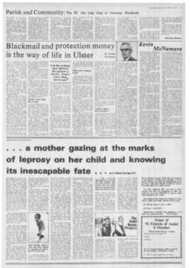Page 4, 1st October 1976
Page 4

Report an error
Noticed an error on this page?If you've noticed an error in this article please click here to report it.
Tags
Share
Related articles
Radical Changes For Liverpool
News In Brief
Southern Bishop Takes On A Northern Challenge
Tv & Radio Elizabeth Bano
I L Le "ift Cardinal Silenced Carves Up
Skelmersdale escaping from the New Town syndrome
ARCHBISHOP WORLOCK of Liverpool included in his plans for the reorganisation of his diocese announced recently a proposal for a team ministry in Skelmersdale, a new town 18 miles south-east of Liverpool.
His announcement coincided with a radical shift in Government policy away from New Towns as the answer to our future needs and towards the restoration of the inner city areas.
' Christians of all denominations have for years been pleading with the Government to halt the decay of the inner city.
In a policy statement last week Mr Shore. Secretary of State for the Environment, finally recognised the pressing need to stop the decline in industry and resulting depopulation of these areas.
But what will now happen to the millions of people who over the last 30 years have been enticed to the New Towns by the glossy brochures which promise better housing and plentiful jobs?
The Church in Skelmersdale already has to cope with the problems of an area which, at 13.9 per cent, has one of the highest unemployment rates in Britain. If industry is now to be attracted to the big cities these problems will intensify and the Church will have to find new ways of responding.
The Churches in New Towns have been criticised, often justifiably. for adhering too closely to traditional parish structures which do not meet the needs of their new situation.
Skelmersdale is one of the few New Towns to avoid this trap. The town has no parish boundaries, only one new church has been built in the last five years, and the life of the Church is almost entirely centred around the Catholic schools.
Some of the reasons for this are historical. The first house in Skelmersdale was built in 1964, but the Church was a late arrival on the scene, insofar as sites were not purchased and churches built in advance of the general development, as has happened in other New Towns. Many mothers, lonely because they have moved to strange surroundings without family or friends, bring their problems to the school. 'l'hrough involvement in the schools many lapsed parents take a new interest in the Church.
Using the schools in this way has helped to combat the idea that religion is something that only happens once a week in a special building called a church.
Because parents are involved throughout the week, mothers coming in to help in the classrooms, to prepare Christmas fairs and other celebrations, religion and Sunday Mass have taken their natural place as part of everyday living.
No buildings empty six days a week
There are no elaborate buildings standing empty six days a week in Skelmersdale.
Of course there are problems. The dual use of any building means more work in preparing spaces for their separate uses. Some more traditional Catholics may resent not having a building they can easily identify as "their church".
Opportunities for private prayer in church surroundings are also limited. If you pop in to the school chapel you arc likely to find it full of infants having their lunch.
Nevertheless, the sight of parishioner-. chatting over a cup of tea in the room where they have just celebrated Mass is refreshing. The opportunities it provides for getting to know
your neighbour in an area where so many are isolated and lonely are vital.
In 1972 a pastoral council was set up consisting of all the clergy, the headmasters and two representatives for every area of the town. It is hoped that in time each area will have its own council.
One area where opportunities have perhaps been lost is in the field of ecumenism. Skelmersdale boasts a purposebuilt ecumenical centre in an ideal spot near the town shopping centre, but the Catholic Church plays little or no part in its activities.
Church fears loss of identity
Individual Catholics are to be seen at the centre, but the Church as a whole has fought shy because it fears the loss' of identity, particularly liturgical identity.
At least one Catholic priest feels that the Anglicans, Methodists, Baptists and United Reformed Church clergy who share the centre have created a "new church" which represents the lowest common denominator of all their Faiths.
The Liverpool diocese contributed £5,000 to the building of the centre, but the practice of saying Mass there was soon discontinued. This has caused some resentment among nonCatholic clergy, and hardly provides a shining example in an area of ecumenical experiment as Skelmersdale is supposed to be.
The future structure of the Church in Skelmersdale is at present under discussion, but will take the form of some type of team ministry.
It seems likely that the priests will live together either in groups of two or three or in a single presbytery from which they will serve the whole town. Each area will have its own priest specially responsible for its needs. but the priests will work as a team on parish visiting and caring for the parishioners.
Such a scheme will also benefit the clergy. The experience of a strong supportive community with a shared prayer life could well enhance the effectiveness of an individual priest's ministry.
Whatever the outcome of the present discussions, one thing is certain: a vital and forward-looking ministry is needed if Skelmersdale is to face its existing problems and the additional difficulties it will have if industry is diverted to the inner cities and away from the New Towns.
It has been said many times in the past that traditional parish structures do not best serve the needs of New Towns. Through circumstance, and perhaps the guidance of the Holy Spirit, Skelmersdale has a Church which has grown from the needs of the community and not from the dictates of Church buildings and parish boundaries.
Much of the future in Skelmersdale will depend on whether the Church has the courage to continue to put its faith in people, not property.
Alex Cosgrave
blog comments powered by Disqus









